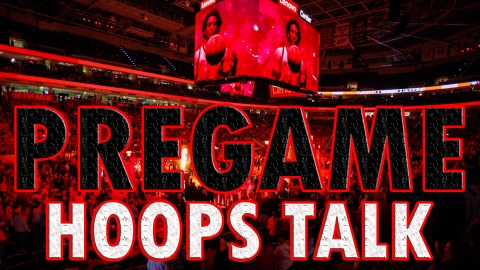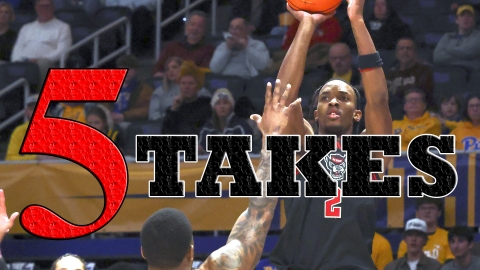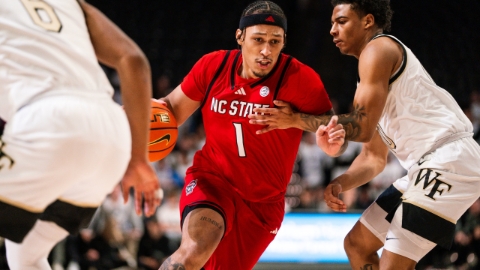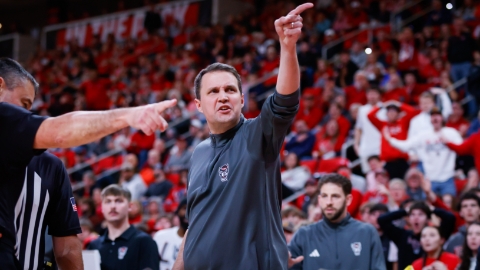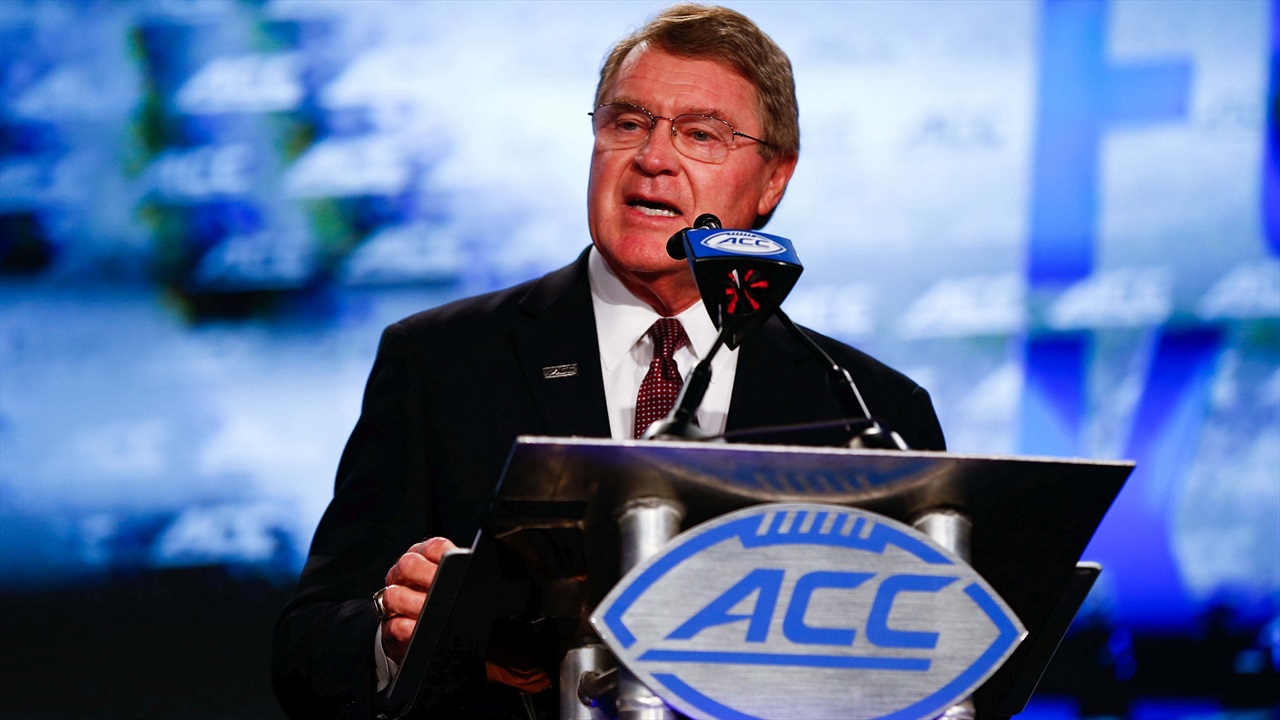
ACC commissioner John Swofford met with the media at ACC Operation Basketball to discuss the league and the upcoming season.
Opening Statement...
As a leader in college athletics and a fan, as we all are, of a great sport in college basketball, I can't help but be concerned about the allegations and the testimony in the case. While we don't know what role the NCAA enforcement process will or can play with the evidence, it's critical to the long-term health of the sport and the health of college athletics that there's institutional and public confidence in the integrity of the sport.
We must find ways to keep the bad actors out of the game and away from the game so the many who do it right, and there are many, in my opinion, can do so with confidence.
In terms of ACC basketball, I don't need to tell you how special the sport is to this league, to our schools to our alumni to our fans.
This year, as with any other years in this league, when it comes to basketball, it's filled with the highest of expectations. And how can it not be that based on the history and tradition of the league and when you consider that the 15 programs we now have as a part of the ACC have, A, captured seven of the last 18 national championships, made 61 Final Four appearances, have won 624 NCAA Tournament games, and just last week I saw where we have 82 players on opening day NBA rosters, and that's by far the most of any conference.
In addition, six of the 30 winningest programs in NCAA basketball history are in the ACC. And since 1981, the league has produced 45 consensus All-Americans.
As I previously mentioned, we'll return to the Spectrum Center for the 2019 New York Life ACC basketball tournament. Earlier this fall we also announced that college basketball's premier conference tournament, meaning this one, will be back in Greensboro in 2020, Washington D.C. in 2021, and Brooklyn in 2022.
That is a rotation that is working very well for us. We're still a relatively new expanded footprint as a conference. We've talked a lot about respecting the past and embracing the present and the future.
And I think that rotation that we're currently in and have been in is doing just that from a tournament standpoint. We're fortunate to have outstanding venues in our footprint that are run extraordinarily well. And we're extremely fortunate to have fan bases at our schools that continue to make our tournament successful wherever it is played.
Now, the first game of this season for all 15 league teams is less than two weeks away. We'll welcome two outstanding new head coaches in Chris Mack at Louisville and Jeff Capel at Pitt, both with ACC experiences in their past, and we'll continue our very successful officiating alliance that will expand to 10 conferences with the addition of the MEAC this year.
Bryan Kersey has turned out to be an extraordinarily good hire as he came off the court after many years of being on the court and is just doing a tremendous job with our league and with the alliance with the other conferences.
All 135 ACC regular season league games and all 14 games of the New York Life ACC Tournament will be available on any ESPN Network, Raycom, CBS Sports, the regional sports networks or ACC Network Extra. Each of these entities continues to be a valued partner and we appreciate their coverage as I know all of our fans do.
In speaking of Raycom Sports, this will be its 37th consecutive year broadcasting ACC basketball. The partnership began with the 1982/83 season. And over the last three decades, it's brought some of the most memorable moments in ACC history to our fans. Although it will not be through the current syndicated package, as this will be the last year of the syndicated package, we look forward to continuing our partnership with Raycom beyond this season.
Again, let me thank you for being here. I now want to open it up for any questions that you might have in regard to anything I did cover or did not cover. We appreciate your coverage.
What was your reaction to the NBA's G League outreach and the offer of contracts to elite players?
David, I think it's fine. I think it's like a lot of things. I think we'll have to see from a practical standpoint how it works. I certainly don't have a problem with it at all from a collegiate perspective. I think it gives another avenue that a young person can take, if he so chooses. And that may be in the best interests of some of those young people.
And hopefully it helps get us to the point where the one-and-done rule can be out of the picture and helps us get to the point where the NBA and the Players Association where players, if they want to, can go directly to the NBA draft. But I don't know a lot about the particulars of it, and I get the impression that the G League and the NBA is still working on a number of those particulars. But fundamentally I think it's good in the sense that it gives some young people another avenue.
And I'm not one that I use Kobe Bryant as an example, obviously one of the great players of all time, and there are others you could use. College basketball never saw Kobe Bryant. And therefore we didn't experience Kobe Bryant. Therefore, I don't think we missed Kobe Bryant.
So I don't think that college basketball is going to be hurt by a half dozen or a dozen really elite players that would have been with us for one year but now being if we reach that point they can go directly into the NBA and would never have been on our campuses.
I just don't believe that creates a negative for college basketball.
You said that you were concerned about what was going on, some of the testimony in the trial. You didn't know what the NCAA was going to do but you were worried about the, quote, integrity of the sport. Do you think that the NCAA needs to act based on what has come up in the testimony at trial to protect the integrity of the sport?
Well, I don't think that what has come up can be ignored in any way, shape or form. So, yes, I think there does need to be some action and I'm sure there will be. I think it's premature to know exactly what that will be. We're in a transition, obviously, at the NCAA, in terms of how major cases will be addressed and how -- I don't know how the NCAA, for instance, Luke, will use court testimony in terms of its processes.
But this sort of puts an interesting and maybe healthy test in front of the NCAA and the transition in the new approach that we're trying to take that's coming out of the Rice Commission right off the bat. And I think that's probably a good thing.
Following up on the November conference games, do you envision every school playing one conference game? When would the games be played in November? Would they be more than just the opening game? Do you see games in December as well in order to get 20 into the schedule?
Yes, yes and yes. We've got 15 schools in basketball. So not everybody can necessarily play a conference game those opening couple of nights. So there will be one that plays a non-conference, very high-profile game that will fit right in in terms of the quality of the game to tip off the season.
Over the course of the trial, some coaches, including some in the ACC, have said they were dumbfounded or surprised at some of the comments and that's not the world they're familiar with. Other coaches, on the other hand, have said they're very familiar with it and it's a problem that needs to be cleaned up. Where do you stand in that?
I think anytime you have the letters "FBI" associated with NCAA, and just... it's not their world. But there's obviously -- and maybe someone described it as -- a conversation I was having, Paul Brazeau in our office and I were talking, and we kind of felt like in a sense that if there's a silver lining in this, it fully exposes a subculture that diminishes college basketball and raises the awareness of it, heightens the sensitivity to it and the need to dig deeper into it, find out what it is and correct it as best as we can correct it.
And you can change systems, change processes all you want. And you need to. And obviously we are collectively in college basketball doing that maybe in a way that it's never been done before coming out of the Rice Commission. And I think that's really appropriate.
But what I don't think we're all talking enough about is individual integrity and accountability. You can have the best rules everything and the best system and the best process. And if people still don't understand you play by the rules, then it seems to me that's where you have to attack it because ultimately it gets down to individuals making deceivious decisions, bad decisions, inappropriate decisions, that undermine those that are in the game that do it well and do it the right way and do it with within the rules.
It's an affront to those people. It's an affront to the system. It's an affront to college basketball. And I think we need to talk about that more. I think we need to attack it more from that perspective.
Going back to the G League, is there a concern in college basketball circles going forward that the NBA might take an all-hands approach to the development from high school, AAU, working with their advertisers and then bypassing college altogether, almost like a European Academy model that would take away the college model for future draft picks?
I don't know. It doesn't say -- I'm not saying it couldn't happen. That's hard for me to imagine getting to that point. So I don't have great concern about that. But in today's world, my eyes are open to just about anything in terms of whether it could happen or not.
Could you view it as a way for colleges to increase competition with the G League, like, okay, they're offering this to you now, maybe it helps with the Rice Commission of you know what, maybe we can make likenesses available for you to cash in on?
Well, I don't know. I don't look at the G League and what they're going to be doing. At least now and as I see it, because I don't think the numbers are going to be great with the G League. And I think there are going to continue to be an awfully lot of young men out there coming out of high school that are very good basketball players that understand and see the value of a college education over their lifetime. And that's good. That keeps us where we need to be. And I'm confident that will continue to be the case.
Had a question for you about the men's tournament. You mentioned -- I think you were saying you like the four cities: Charlotte, Greensboro, DC and Brooklyn. First of all, did I hear you correctly on that? And secondly, do you then view it as you would like to stay pretty steady with those four cities rotating as host sites?
Well, I really like the rotation we have with those four cities. You heard me absolutely correctly in regard to that, because I think it serves our league extremely well and we need to be in different parts of the league with our footprint at this point in time, and we've talked about New York before. Washington, the last two times we've been there, has been tremendous.
And our schools, not just athletically, but our presidents and institutional personnel that deal with Washington DC kinds of things, if you will, it's important for there to be a presence there. And the fan feedback we got was tremendous in regard to being in DC. New York maybe for different purposes, not as much governmental, but really important for all of our schools to be there periodically. And obviously that's a part of our footprint in those two years there from our perspective went extremely well. And while we've had some history in Washington, it's relatively new, but, you know, fits the footprint better than it ever has before.
And then you have North Carolina, where the tournament was built and became what it became in Greensboro and in Charlotte. And I can't guarantee you the future. Ultimately the schools vote on it. But I think most everyone in our league would tell you this rotation is serving us well, has served us well. And that's why we basically came right back to it for those next two years.
And I mentioned in my remarks, I mean, there doesn't seem to be another league out there that can move their tournament around and have the success with it that we've been fortunate enough to have. And that's because of our fans and the tradition and history that was built with the tournament over a long period of time and most of that was built in North Carolina.
So that thought of respecting the past and embracing the future as well as the present really relates to a lot of things and how we try to address things in our league.
But it really fits the tournament rotation from my perspective.
And Erik being from Charlotte, this is quite a Charlotte-centric year for us as a league, obviously, with this event being here, the football kickoff was here, our football championship game has truly found a home here and we'll be here for that for a number of years.
And then coming back here periodically this year with the basketball tournament. It's a pretty special year between Charlotte and the ACC.
Have there been further discussions pertaining to gambling? And with that said, what sort of feedback have you gotten concerning the removal of the requirement of injury reports on a weekly basis during ACC contests?
We've had a number of discussions about gambling and where that's headed and what that means for us. The biggest thing we're trying to do as a league, and I think this is flowing well, is getting educated about what legalized gambling means or could mean in terms of college athletics and our world.
And the approach that we're taking and seemingly most of our colleagues are taking a similar approach as is the NCAA, is to not jump into this too quickly until we really understand it and see where it's totally going to land.
We haven't had any states as yet in our footprint legalize gambling. It doesn't mean they won't, and I would fully expect that some of those states will.
There's also a hope that Congress may, for those states who do choose to legalize gambling, that Congress brings some consistency in terms of how that's done in those states. So that -- for instance, in our league, we have schools in 10 states. We could have 10 different set of processes and regulations and requirements to deal with. We'd much rather have one.
Obviously Congress is not going to step in and tell the states they can't legalize it. Congress, I think, could exempt amateur sports or collegiate athletics or high school athletics.
I don't know whether that will happen or not. Candidly, that would be my first choice. But I don't necessarily expect that to happen. But it could happen.
So there's a lot of clarity that will need to be brought to this, and we're going to need to continue to understand what it can mean to us and what we as a conference, what our institutions at the campus level would need to do in terms of educating our players, what it would mean in terms of the people around our players.
Does it create an environment where young people think, well, it's legal, therefore it's okay -- there's nothing wrong with this. And then does that make it easier to infiltrate into affecting the outcome of games? College athletics has been there before, a long, long time ago. And we certainly don't want to be back there again.
But it's going on anyway. We get that. It's happening. It's happening illegally. What does legalizing it mean? So we're laying the groundwork on that. And we brought in some legal advisors that have been prominently involved with Europe and the Premier League in Europe and legalized gambling there.
So that's what we're in the process of doing now. They've been very helpful, too. Very insightful.
And I think you asked about the injury reports. We were the only one doing that. And it was kind of a gentleman's agreement. Our coaches decided they would not rather do it this year, as all of this started playing out. I think there will need to -- I think we need that going forward. It's not just an injury. It could be -- I guess you'd call it player availability because you can have suspensions or other situations that can come up where a player might not be playing, and in the legalized gambling world I think that needs to be there.
You talked about television and the 20-game schedule kind of separately but we hear they're interconnected. How did you weigh the value of playing conference games in November and just how much did television impact that?
It had an impact. I think there are a lot of reasons to do a 20-game schedule even without television. Television adds another reason to do so. Probably makes it a little tougher on the coaches. But I suspect most of you welcome that. I think fans welcome that.
So I think it will be popular. Having our own channel is a factor in that, because we need quality inventory and there's nothing of any higher quality, generally speaking, than two ACC basketball teams playing each other.
And the early season, you know, we've talked a lot about how do you tip off the basketball season in a way that you kick off the football season? And that's really hard to do, because of obvious circumstances. And our discussions have been more national about that.
This is a way we can sort of address it just as a conference in terms of tipping off the year. And if you go back -- gosh, you can go back in the '60s, there were ACC conference games in December in the '60s. A lot of people forget that. I think it will be fun. I think it will be a terrific thing.
Would this basically be everyone plays one conference game at the start of the season and then it's all non-conference until end of December or it will be coupled conference games for everybody in November? How will that be working out?
There will be a couple before Christmas and then it will get back into the more normal flow.
Will they all be on the new channel or will these November games be spread out among different -- ESPN, that kind of thing?
They'll be spread out but some of them will definitely be on the ACC channel.
Whose idea was this and are the coaches being kind of dragged, kicking and screaming, along with this idea, or what was kind of their reaction there?
No, they bought into the idea pretty readily, actually. Kind of coming out of the discussions about how do you give some bang, so to speak, to the start of the season.
You touched on this briefly with your answer here. But as far as when it comes to a lot of coaches saying that they don't feel like their teams are ready to play a team of an ACC caliber right off the bat, how do you go about making sure that those fears are quelled? And also, when it comes to non-conference scheduling, to make sure that that still stays up to par with the rest of the teams?
Well, that becomes institutional. And I'm not real worried about the non-conference scheduling staying up to par where it should. If it doesn't, of course the additional couple of conference games enhances your schedule right there. But I think you'll still see quality non-conference games going on. I don't think our schools are all of a sudden going to quit playing those kinds of games for a lot of reasons.
